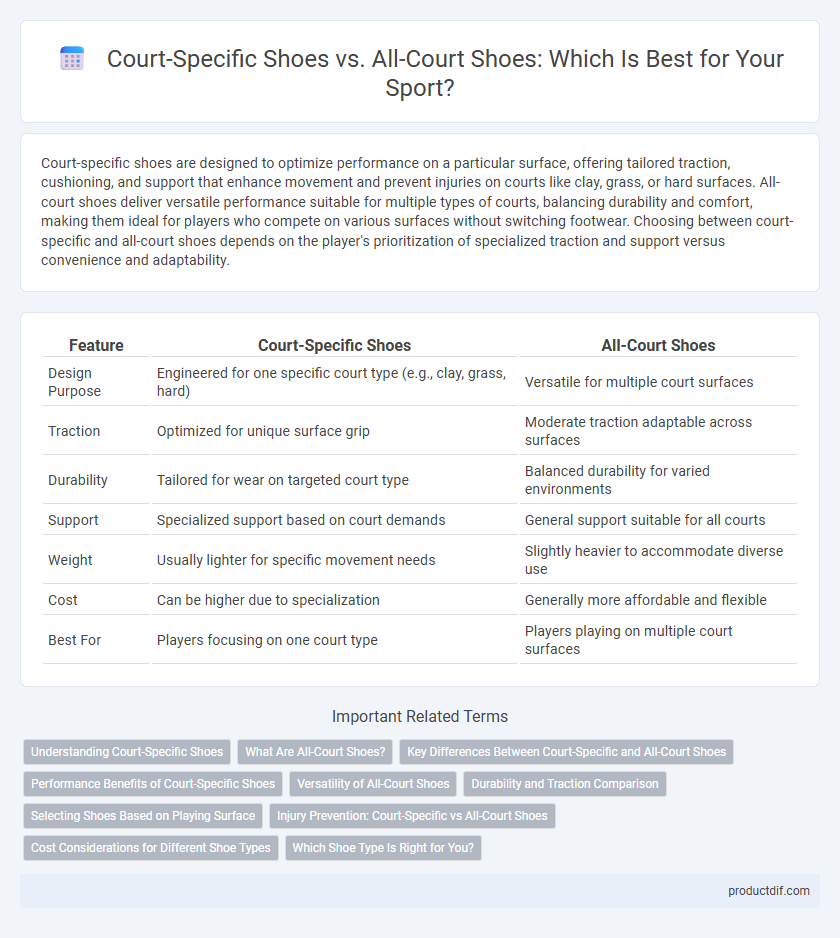Court-specific shoes are designed to optimize performance on a particular surface, offering tailored traction, cushioning, and support that enhance movement and prevent injuries on courts like clay, grass, or hard surfaces. All-court shoes deliver versatile performance suitable for multiple types of courts, balancing durability and comfort, making them ideal for players who compete on various surfaces without switching footwear. Choosing between court-specific and all-court shoes depends on the player's prioritization of specialized traction and support versus convenience and adaptability.
Table of Comparison
| Feature | Court-Specific Shoes | All-Court Shoes |
|---|---|---|
| Design Purpose | Engineered for one specific court type (e.g., clay, grass, hard) | Versatile for multiple court surfaces |
| Traction | Optimized for unique surface grip | Moderate traction adaptable across surfaces |
| Durability | Tailored for wear on targeted court type | Balanced durability for varied environments |
| Support | Specialized support based on court demands | General support suitable for all courts |
| Weight | Usually lighter for specific movement needs | Slightly heavier to accommodate diverse use |
| Cost | Can be higher due to specialization | Generally more affordable and flexible |
| Best For | Players focusing on one court type | Players playing on multiple court surfaces |
Understanding Court-Specific Shoes
Court-specific shoes are engineered to meet the unique demands of particular sports, such as basketball, tennis, or volleyball, offering tailored support, traction, and durability for optimal performance on specific court surfaces. These shoes often feature specialized outsoles with patterns designed to enhance grip on hardwood, clay, or synthetic courts, reducing the risk of slipping and improving agility. Superior cushioning and lateral stability in court-specific shoes help prevent injuries by accommodating the sport's distinctive movements, making them essential for athletes seeking sport-specific footwear advantages.
What Are All-Court Shoes?
All-court shoes are designed to provide versatile performance across multiple playing surfaces, including both indoor courts and hard outdoor courts. These shoes typically feature a durable rubber outsole with a tread pattern that balances traction and durability, along with cushioning systems that support lateral movements and quick direction changes. Suitable for players who transition between different courts, all-court shoes offer a combination of stability, comfort, and durability without being specialized for a single surface like court-specific shoes.
Key Differences Between Court-Specific and All-Court Shoes
Court-specific shoes are engineered to meet the unique demands of specific sports, offering tailored support, cushioning, and traction for activities like tennis or basketball. All-court shoes provide versatile performance across multiple surfaces, balancing durability and grip but with less specialized features. Key differences include targeted sole patterns, weight distribution, and stability designed to optimize movement for particular court types.
Performance Benefits of Court-Specific Shoes
Court-specific shoes deliver enhanced performance by offering tailored support and cushioning designed for the unique movements of each sport, such as lateral stability for tennis or shock absorption for basketball. The specialized traction patterns improve grip and agility on specific court surfaces like clay, grass, or hardwood, reducing the risk of slips and injuries. Optimized fit and durability in court-specific shoes contribute to sustained comfort and protection during intense play, outperforming general all-court models.
Versatility of All-Court Shoes
All-court shoes offer superior versatility by combining features optimized for various court surfaces, providing reliable traction and support on both indoor hardwood and outdoor asphalt courts. Their multi-surface adaptability reduces the need for multiple pairs, making them ideal for players who participate in different types of court sports or switch venues frequently. Enhanced durability and cushioning in all-court shoes cater to diverse movements and impacts, ensuring consistent performance and injury prevention across all playing conditions.
Durability and Traction Comparison
Court-specific shoes feature specialized traction patterns and durable materials tailored for the demands of particular sports like basketball or tennis, ensuring optimal grip and longer wear on specific court surfaces. All-court shoes offer versatile durability and traction designed to perform adequately across various playing surfaces but may wear down faster under high-intensity, sport-specific movements. Choosing court-specific shoes enhances durability and traction efficiency, reducing slippage and sole degradation during sport-specific lateral and multi-directional movements.
Selecting Shoes Based on Playing Surface
Court-specific shoes offer targeted support and traction designed for surfaces like clay, grass, or hard courts, enhancing performance and reducing injury risk. All-court shoes provide versatile cushioning and tread patterns suitable for multiple surfaces but may lack specialized grip or durability for extreme conditions. Choosing shoes based on the primary playing surface ensures optimal stability, comfort, and longevity tailored to the demands of that court type.
Injury Prevention: Court-Specific vs All-Court Shoes
Court-specific shoes provide tailored support and cushioning designed for the unique movements and surfaces of a particular sport, significantly reducing injury risks such as ankle sprains and joint strain. All-court shoes offer versatility across different playing surfaces but may lack the specialized features necessary for optimal injury prevention on any single court type. Choosing court-specific footwear aligns with biomechanical demands and improves stability, minimizing the chances of overuse injuries and ensuring better overall foot protection during play.
Cost Considerations for Different Shoe Types
Court-specific shoes typically cost more due to specialized materials and design tailored for specific surfaces like clay, grass, or hard courts, enhancing performance and durability. All-court shoes offer versatility across multiple court types at a generally lower price point but may compromise on the specialized features and longevity of court-specific models. Budget-conscious athletes should weigh the upfront cost against potential savings from reduced wear and better performance when selecting between court-specific and all-court shoes.
Which Shoe Type Is Right for You?
Court-specific shoes provide tailored support and traction designed for particular sports like basketball or tennis, enhancing performance and reducing injury risk. All-court shoes offer versatile cushioning and stability suitable for multiple surfaces, making them ideal for players who switch between different types of courts. Choose court-specific shoes for optimal sport-focused benefits, or opt for all-court shoes if you need adaptability and comfort across diverse playing conditions.
Court-specific shoes vs All-court shoes Infographic

 productdif.com
productdif.com